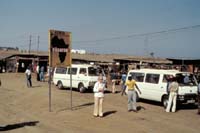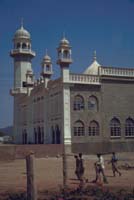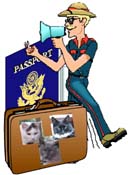| |
After a few days in Nairobi and a night in one
of the treetop lodges in the foothills of Mount Kenya, we set off in our safari
van for Samburu in the northern parts of Kenya. Samburu was very dry and the
drive was about 4 hours long over dirt roads. Not long after we started, we
stopped at Nanyuki at the "equator shopping mall". Here we had the opportunity
to purchase beads, carvings and other handicrafts and to have our photos taken
on the equator. Along the way, before the land became arid, we would see impala
and giraffe grazing on the side of the roads as we see cattle, horses and
occasionally a deer here in California.
The lodge we stayed at in Samburu
was quiet with a pool, lawns and gardens. When we weren't out on our morning or
afternoon game drives, we could sit in the lounge chairs and enjoy fruit drinks
and other refreshments. One person was enjoying a drink that had a piece of
pineapple on the lip of the glass. As she looked away, a Vervet Monkey rushed
in, grabbed the pineapple and left.
From Samburu we travelled, via the Mount Kenya
Safari Club and Nairobi to the parks nearer Tanzania including Tsavo and
Amboselli. Tsavo is a park area with a long history. When the railroad was
being built across Kenya, it was very hazardous working in the Tsavo area as
the lions had become accustomed to preying upon humans. This, fortunately for
us, was long ago but the history remains. Tsavo was a dry, barren area that
includes an old volcanic lava flow. One day we drove up on a cinder cone in the
lava flow area. When the driver turned off the engine, although there was soil,
there wasn't a plant or an animal in sight. The stillness was indescribable and
the silence was so loud it hurt your ears. It sounded like two huge seashells
were being held on our ears. Never before or since have we heard silence so
absolute.
Our lodge at Tsavo was one of those where we were in the building
and the animals were outside - period. There was a "knee wall" that kept the
larger animals out of the dining room and each of our rooms had a balcony that
looked out onto the plain. We were warned not to leave anything on our balcony
and to make sure we always closed and locked the balcony door (even above the
ground floor) as the baboons often climbed up the balconies, got into the rooms
and stole cameras. The lodge staff would then have to go out onto the plain and
retrieve the guests' belongings.
At night while we were in Tsavo, we kept
hearing coughing from outside our balcony. By then we had been in Africa for
over a week and we thought that maybe some of our fellow tourists were
wandering around outside. In the morning, as dawn broke, those coughs turned
into the rustling of the trees, a thump and a grunt as the baboons (who slept
in the trees outside our room) awoke, rolled over and fell out of their
trees.
From Tsavo, we journeyed via a Masai village to
Amboselli. The Masai village was interesting. The safari guide negotiated with
the village chief and we went in to visit their homes and purchase their
beadwork. While Jack was photographing this whole event, a number of Masai
women placed their beadwork on his arm. When Jack discovered what had happened,
he tried to negotiate with the women (who spoke neither English nor Swahili) to
purchase a few of the numerous necklaces. Jack chose a few, one woman quoted a
number and Jack paid her. When he tried to leave, the women became very upset.
Just before a war broke out, our guide and the chief came and intervened. The
chief spoke Masai and Swahili. The guide spoke Swahili and English and between
the two of them, they discovered that the beads that Jack chose were the
product of several women and he had only paid one woman. The guide and the
chief negotiated and Jack paid the women a few more shillings.
In the
interim, Jan did purchase some beads. However, she was approached many times by
Masai warriors who wanted to sell her a spear. Jan didn't want a spear but the
warriors kept after her, even demonstrating the the spears came apart to fit in
a suitcase. Overall, we were glad to get to Amboselli, Jack with his photos and
Jan with her beads and no spear.
We left Amboselli by air, destined for Kichwa
Tembo, a tented camp in the Masai Mara. As we approached the Kichwa Tembo
airport, our airplane had to make a low-level pass over the runway to scare off
the zebra, wildebeest and giraffe that were grazing on the grass airstrip. As
we finally landed, our plane was escorted by two safari vehicles (one on each
side) that drove slightly ahead of us to keep the animals from returning to the
runway. It was a lot like in the old Africa movies.
Little did we know when
we began our safari that with each new lodge, we would be staying closer and
closer to the animals, eventually living in their midst at Kichwa Tembo. Kichwa
Tembo was a magical place. The herd of grazing animals were just beyond the
edge of the resort and there was no fence or other barrier to keep them out.
There was a placard in our room warning that the African Cape Buffalo was very
dangerous, despite its vacant look and slow appearance. There were armed guards
to escort us to our tent every night after dinner. And it was not unusual to be
awakened in the middle of the night with a buffalo or a hippopotamus rubbing
against the ropes of your tent.
Our tent looked directly out onto the Masai
Mara plain - the northern extension of the Serengeti. The great herd of zebra
and wildebeest were in the Mara while we were there that year. On this plain it
might have been 20 miles or more to the horizon; as far as we could see, there
were lines of animals walking two and three abreast. The line zigzagged across
the plain from one side of the horizon to the other and back. A very crude
calculation told us that there were probably 250,000 wildebeest and 25,000
zebra within our view. There were also hundreds of elephant, buffalo, giraffe
and gazelle and tens of lions and cheetah. Closer to home there were red, blue
and green swallowtail butterflies and giant African beetles.
One evening,
Jan was crossing the compound going through the forest to another tent. She
heard a low buzzing sound that stopped abruptly quite close to her. She was
relieved until she looked down and found a Giant African Beetle landing on her
leg - wham! It was about 6 inches long and almost knocked her over as it
landed. Jan always carried a small purse with her. She began hitting the beetle
with the purse and it looked at her and asked for more abuse. She finally got
the purse under the beetle and pried it off her slacks. Another conquest for
mankind (and a good story).
Probably our most memorable game drive was one
morning when our driver found a cheetah sitting on a small hill. As we drove
up, the cat began running. We followed in the safari vehicle but couldn't drive
as fast as the cat could run. When we arrived at the cheetah again, it had just
caught a baby Thomson's Gazelle (Our guide estimated it to be a week old.) The
mother gazelle was a few yards away, watching, and the rest of the herd of
gazelle and zebra was returning to their grazing. We watched as the cheetah
suffocated the baby by puting its mouth on the baby's muzzle. The cheetah then
did what came naturally and satisfied its hunger. This was the first animal we
had ever seen killed. While we have seen several since, the loss of a baby so
young and so innocent still tugs at our hearts.
At Kichwa Tembo we fell in love with Africa and
the concept of camping with the animals. As we left Kichwa Tembo for the flight
back to Nairobi (and eventually home), we hoped to return to Africa, as here we
had found a simpler and more tranquil existence that nourished our often
overstressed spirits.
The
End |

Equator shopping center at
Nanyuki. |

A mosque in northern Kenya. |
|


